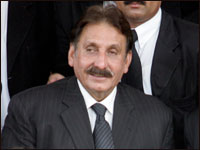
Source:
The News International Besides the Lawyers community, the HRCP and the People’s Resistance to also take part in the protest
The lawyers community will stage a protest demonstration on Thursday to celebrate “Iftikhar Day” at the Karachi Press Club (KPC) to express solidarity with the deposed Chief Justice of Pakistan (CJP) Justice Iftikhar Muhammad Chaudhry.
The call for a country-wide protest demonstration was given by the Sindh High Court (SHC), and was later endorsed by the Pakistan Bar Council, which, in a joint meeting, declared to observe January 31 as ‘Iftikhar Day’ to salute the former chief justice for his continuous detention since March 9, when he was made non-functional by the President of Pakistan Pervez Musharraf.
Giving plans for the day, President Sindh High Court Bar Association (SHCBA), Rashid Razvi, in a joint press conference at the Shuda-e-Punjab Hall on Tuesday, informed journalists that all the bars of the country would observe the day by holding demonstrations, protest processions and seminars across the country to pay homage to deposed Chief Justice of Pakistan Iftikhar Muhammad Chaudhry.
General-Secretary, Karachi Bar Association (KBA), Naeem Qureshi, while giving details of the protest plan, said that all 310 bars of the country, including the Supreme Court Bar Association, Pakistan Bar council, Sindh Bar Council, all the high court bars of the country and the Malir Bar Association (MBA), endorsed the decision.
He disclosed that the elected body of the KBA, along with its members, would reach the SHC in a form of a caravan, where MBA members would also join in. A joint governing body meeting would be held at the SHC, from where thousands of lawyers would march towards the KPC.
He appealed to all civil society organisations, NGOs, students’ bodies, political party leaders, labour unions and other concerned citizens to join the rally to voice their protest against the illegal detention of the CJP and their support for the revival of democracy, rule of law and restoration of all judges deposed after promulgation of emergency on November 3.
The procession to the KPC from the SHC would be led by Rasheed Razvi. Speaking to journalists, the SHCBA president said that no judge in the world had ever been detained, which was, unfortunately, the case for jugdes in Pakistan.
He said that the CJP was to appear before the review board, but, to date, the government had been unable to produce him there, nor was any habeas corpus filed by any lawyer for his detention.
He further said that, unfortunately, while most wanted criminals such as Rashid Rauf were at large, a respected CJP was under detention. Razvi said that the CJP was not even allowed to offer Eid prayers, as if he was a hardened criminal.
He said that the action against the judiciary, media and other segments of society was taken by the government only to prolong one man’s rule,
Judges who were removed under the PCO would also address the gathering on “Iftikhar Day”, informed Razvi, who, however, added that their names could not be disclosed due to security reasons, as they would be placed under house arrest, he apprehended.
Vice President of Malir Bar Association, Ashraf Samoo, also endorsed the call.
Replying to a question, Razvi said that the HRCP has supported the call, while a civil society organisation, the People’s Resistance, has also backed it. He said that no political parties have approached the lawyers in this regard.
The political parties were, however, requested to include the restoration of judges in their election manifesto, which would help lead the country towards real democracy. During a meeting with Asif Zardari at Naudero, Qureshi said, they requested him to include the demand for an independent judiciary in the PPP election campaign.



 Source:
Source:  Source:
Source: 






 Source:
Source: 


